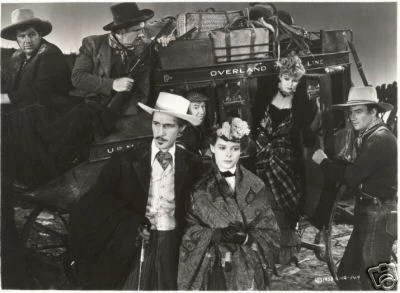
Well, there are some things a man just can't run away from.
—The Ringo Kid (John Wayne)
|
Stagecoach is a classic 1939 Western directed by John Ford, featuring John Wayne's first major role. The actor had previously appeared in some 80 B pictures; most studio executives were vehemently opposed to casting him in a major film, but John Ford (whose first sound Western this was to be) insisted on Wayne. (Notably, the actor was paid far less than any of his co-stars except for John Carradine.) Ford, well known for abusing his cast and crew, reportedly brutalized Wayne to screw an effective performance out of him — and succeeded. This film also marked the first time that Ford would shoot in Monument Valley, Utah, the site that would become his favorite setting and almost a trademark of his films.
The film was remade in 1966 by director Gavin Douglas, with Alex Cord replacing Wayne as the Ringo Kid, Bing Crosby as Doc Boone, Red Buttons as Peacock, Stephanie Powers as Mrs. Mallory, Mike Connors as Hatfield, Robert Cummings as Gatewood, Van Heflin as Curley, Slim Pickens as Buck, and Ann-Margret as Dallas. Despite an improved script (the Gatewood subplot is particularly satisfyingly tied in to the Ringo plot, with Keenan Wynn's delightfully nasty Luke Plummer being fatally hired by the defaulting banker) and a remarkably strong showing by Crosby, the film is killed dead by a leaden performance by Cord. Ultimately the most memorable aspects of this remake are the portraits done of the cast in-character by Norman Rockwell.
- Adaptation Distillation: The movie draws inspiration from "Boule de Suif", a short story by Guy de Maupassant. The story is a social critique of French passengers trying to flee a hot spot in the French-Prussian War, and where one of the passengers (a jovial well-meaning prostitute) is forced to have sex with a Prussian officer to help the coach passengers escape. The movie changes the setting, removes the degradation of the prostitute, but leaves the social critique pretty much intact (with a karmic punishment for the crooked banker, as required by the Hays Code).
- A more direct source of the movie was "The Stage to Lordsburg" by Ernest Haycox, which had a "bare-bones plot". Ford merged it with de Maupassant's story to add more characterization.
- The Alcoholic: Thomas Mitchell earned his Best Supporting Actor Oscar for being convincingly alcoholic as Doc Boone. By movie's end - having proved himself a good doctor - he's hinting at cutting back on the whiskey...
- Badass: The Kid and Hatfield
- Badass Longcoat: Hatfield
- Bait and Switch Gunshot: Hatfield's gun touches Mrs. Mallory, gunshot is heard... and Hatfield's hand crawls back as he dies (then again, the gun didn't smoke or anything).
- Bottomless Magazines: Sort of. The passengers fire more times than they should be able to and then all run out of ammo at once.
- Card Games: Used when Hatfield cuts the cards to decide whether to go on to Lordsburg, and again for Foreshadowing when Luke Plummer is dealt the "dead man's hand" while playing poker.
- Ford loves using the Aces and Eights to foreshadow doom.
- The Cavalry
- Corrupt Corporate Executive: Gatewood
- Dead Man's Hand: Luke holds this hand. He is shortly thereafter gunned down by the Ringo Kid.
- Enemy Mine: Wilcox and the Ringo Kid
- The Gambler: Hatfield again
- Hooker with a Heart of Gold: Dallas
- Jerkass: Gatewood
- Revenge: The Kid's motivation to get to Lordsburg.
- Running Gag: No one can seem to remember Mr. Peacock's name.
- The Savage Indian: Local Navajo Indians were enlisted to play the part of the bloodthirsty Apaches.
- Sour Prudes: The women who hate Dallas are given no characterization or social context beyond being hateful out of pure prudishness. No hint of them feeling fear or humiliation that their husbands may be unfaithful to them and that they are at too much of a social disadvantage to dare blaming it on them.
- Southern Gentleman: Hatfield. He's more gambler than gentleman, though.
- Standard Snippet: Par for the course in a John Ford movie, but probably used more here than in any other. By one count, the score uses seventeen folk and popular songs from the era, some as leitmotifs, for instance I Dream of Jeanie With the Light Brown Hair for Mrs. Malory.
- The Trope Kid: The Ringo Kid
- US Marshal: Wilcox
- The Wild West
| Vatican Best Films List | |
|---|---|
| The Vatican's list of the 45 best films made before 1995 | |
| Art |
|
| Religion |
|
| Values |
|
